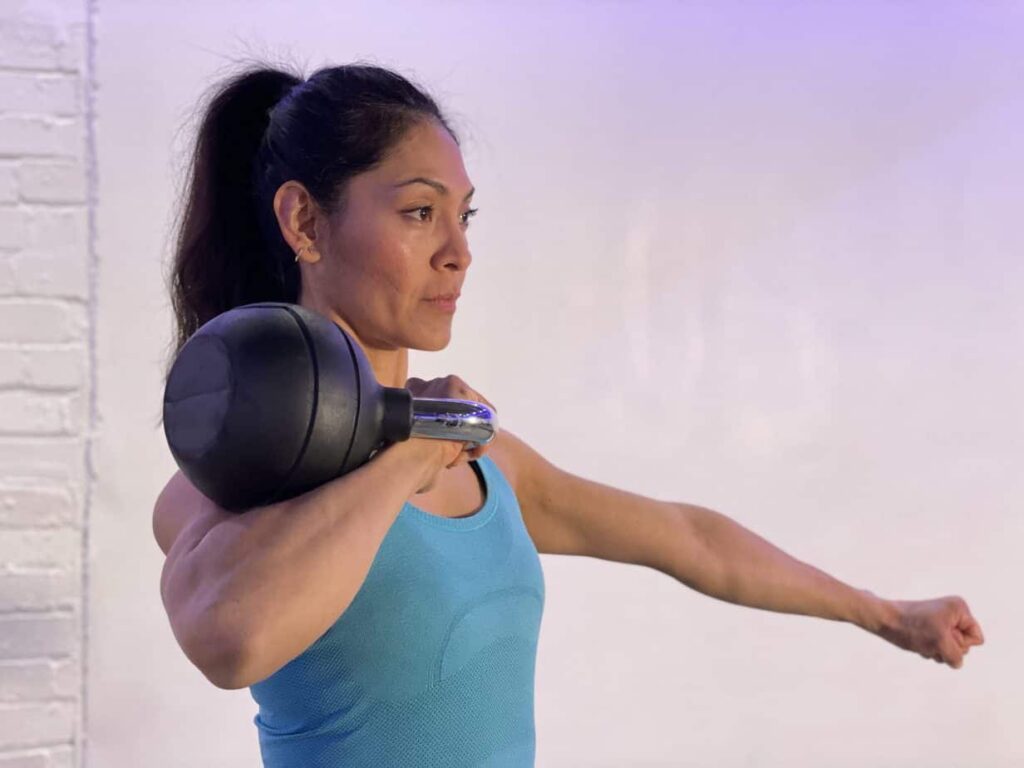The benefits of strength training in general are well documented – but the benefits during the menopause are second to none.
From improving muscular strength and increasing bone density to reducing stress and anxiety, strength training does it all.
As the retirement age increases, its becoming more apparent how detrimental the symptoms of the menopause can be for women whilst trying to maintain a normal working and social life. No matter when strength training is started, the benefits can really help.

In this article we will not only outline what strength training is but also how it can help alleviate some symptoms of the menopause that can be extremely detrimental to a womens every day life.
What is the menopause?
The menopause is when a womens periods stop due to low hormone levels. This usually occurs around the age of 45-55 years, however it can occur sooner naturally or as a result of surgeries such as an oophorectomy (removal of ovaries) or a hysterectomy (removal of the uterus). Cancer treatments such as chemotherapy and/or genetics can also cause menopause to occur early as well.
Symptoms of the menopause can fall into 2 categories: Physical and Mental.
Physical signs
The physical signs and symptoms are likely to be the most noticeable as they include the stopping of your periods, hot flushes, difficulty sleeping, change in body shape and weight gain, headaches and migraines that are worse than usual, and skin changes such as now having dry and itchy skin. When you start to get a combination of all of these things and you are in or near to the age category for the menopause, it’s a highly likley the cause of the changes.
Mental well-being changes
With regards to changes within your mental health, these may not be as easy to spot. Especially as awareness around Mental Health and the psychological changes pre and during the menopause are not documented as much as the physical changes. The mental health symptoms of the menopause include low mood, anxiety, mood swings, low self esteem but also problems with memory or concentration. A lot of people with the menopause complain of experiencing ‘brain fog’. These symptoms can often be shrugged off as “having a bad day” or “just not feeling yourself at the moment” and are often overlooked.
Perimenopause and other changes
Perimenopause is when you have symptoms before your periods have stopped. You reach menopause when you have not had a period for 12 months. During perimenopause you may experience some physical and/or mental symptoms, however these can change over time.
All symptoms will have a detrimental effect on everyday life and the main symptoms people like to combat quickly are their sleep quality, weight gain and anxiety levels. These usually have the biggest impact on our day to day lives, both work and social. The exercise that we do can have a huge impact on reducing the symptoms and allowing our day to day lives to stay relatively normal and how they used to be.
What is strength training?
Strength training, also known as resistance training, is when exercises are done that require the muscles to work against a weight or force. This in turn maintains or increases muscular strength and bone density.

Strength training can be done using free weights such as dumbbells or kettlebells or weight machines, but an increase in strength can also be achieved by just using one’s own body weight. We all weigh something at the end of the day.
There is a difference between building size and maintaining or building strength and that difference is volume. Training for an increase in muscle size (hypertrophy) requires a higher total volume than strength maintaining and building does. Training for strength is all about increasing force production rather than increasing muscle size and maintaining or improving bone density to reduce chances of injury.
As we get older, we start to experience Sarcopenia. This is the involuntary loss of muscle mass, strength and function. Muscle mass decreases approximately 3-8% per decade after 30 and this rate of decline increases further after 60 years. A decrease in muscle mass is also accompanied by a progressive increase in fat mass and consequently changes cause changes to body composition. So this is where strength training can help.
Why does strength training help during the menopause/peri-menopause?
Strength training allows us to maintain muscle mass and with muscle mass being vital in keeping us healthy and allowing for longevity with our functional movement, it becomes especially important during the menopause. During strength training, stress is also put onto your bones, improving their resilience and density.

During peri-menopause and the menopause women start to experience some changes both physically and mentally with their bodies due to changes in hormone levels. A decrease in oestrogen being the biggest and main cause of most of the symptoms.
Some symptoms of the menopause include, weight gain, an increase in body fat mass and more aches and pains in joints.
Oestrogen is considered to be an appetite suppressing hormone and one form of oestrogen, estradiol, helps to regulate metabolism and body weight. So as it reduces, appetite can increase. Strength training can help by maintaining as much muscle mass as possible. This helps regulate our metabolism and reduce the chances of increasing our body fat percentage to dangerous levels, which then increases the risk of getting diabetes or heart disease. The more muscle you have the ‘higher’ your metabolism so the more calories can be consumed before heading into a surplus.
From a bone density perspective, from the age of about 35 we start to lose calcium from our bones. The rate of this increases as our oestrogen levels drop increasing the risk of osteoporosis as oestrogen is required to help lay down bone. Activities that put stress on bones can nudge bone-forming cells into action. That stress comes from the tugging and pushing on bone that occur during strength training. The result is stronger, denser bones and slows down the effects of reduced oestrogen during the menopause.
Now from a psychological perspective, strength training also has its benefits. Increased cortisol and therefore stress levels during the menopause can be hugely detrimental to every day life, both work and social. Strength training can really help here. Physical exercise helps to release our feel good hormones, endorphins. These help to raise our mood and switch our mentality to “I can” rather than “I can’t or I can’t be bothered”. Anxiety reduces, cortisol levels go back to their normal levels and all is good in the world again. Regular exercise and regular endorphins being pumped out increases self confidence, improves mood and can help you relax. In turn and in time a reduction in stress and anxiety levels will contribute to better sleep as well. Another symptom of menopause is broken sleep.
The mayo clinic have said it well:
“All of these exercise benefits can ease your stress levels and give you a sense of command over your body and your life”
It can very easily feel like your own body is slipping away from you – but strength training can really help you take back control both physically and mentally.
What might a strength training workout look like for a client experiencing the menopause?
For a client experiencing the menopause a strength training workout can be extremely flexible. However the programme will be progressive. Progressive overload is extremely important in making sure muscular strength is maintained or improved over time. Depending on how many strength sessions are being done per week will depend what each session looks like, but 9/10 each session will be a Total Body workout. So upper body, lower body and core exercises will all be completed.

When I say the workouts will be flexible I’m referring to the whole workout session. Some symptoms of the menopause may be playing up more than others on a particular day, so a workout can be flexible in intensity and volume to accommodate how you are feeling.
Your training history
Your programme will depend on what your training history looks like. If you have worked on strength training the majority of your adult life, it is unlikely this training will change. A slight reduction in weight may have to occur as time goes on but not necessarily. This is where it’s good to have a trainer guide you. It’s inevitable as we get older we will lose some muscle mass and therefore some strength. So maintaining correct technique and posture is vital in making sure no injuries occur. If this means lowering the weight or decreasing the volume on some exercises then that is best in order to keep training.
New to strength training?
If you are new to strength training whilst going through the menopause, you will be best to learn both upper and lower body movements patterns through a range of bodyweight exercises before then progressing on to using resistance such as dumbbells, kettlebells or weight machines. Again this is where a trainer can help guide and progress you on naturally as you get stronger and nail the movements patterns correctly.
Using goals and accountability to help
During the menopause motivation can be low and anxiety can be high. Having a trainer by your side with sessions in the calendar makes you more accountable. You have someone to be accountable to and someone to motivate you when you need it the most. As well as high anxiety in general, anxiety around a change in body image may also be present. Strength training doesn’t need to focus on the calories burned in a class or how high your heart rate gets. Strength training can focus on performance goals rather than aesthetic goals.
Wanting to complete a full pull up or push up and squat a certain weight are all examples of performance goals that physiologically can take you away from the thoughts about body image. They can change your mindset when it comes to going to the gym and why you’re going. You are going to get stronger and fitter. You are turning up to the gym to work on your deadlift or your lunges so you can hold those heavier dumbbells and get that feeling of accomplishment afterwards.
Exercise in general has so many benefits to our health, functionlaity and longevity but strength training exceeds these benefits when it comes to reducing symptoms caused by the menopause.
If you’d like to hear more about training before, during, or beyond the menopause, why not contact us and chat about what we can offer?

